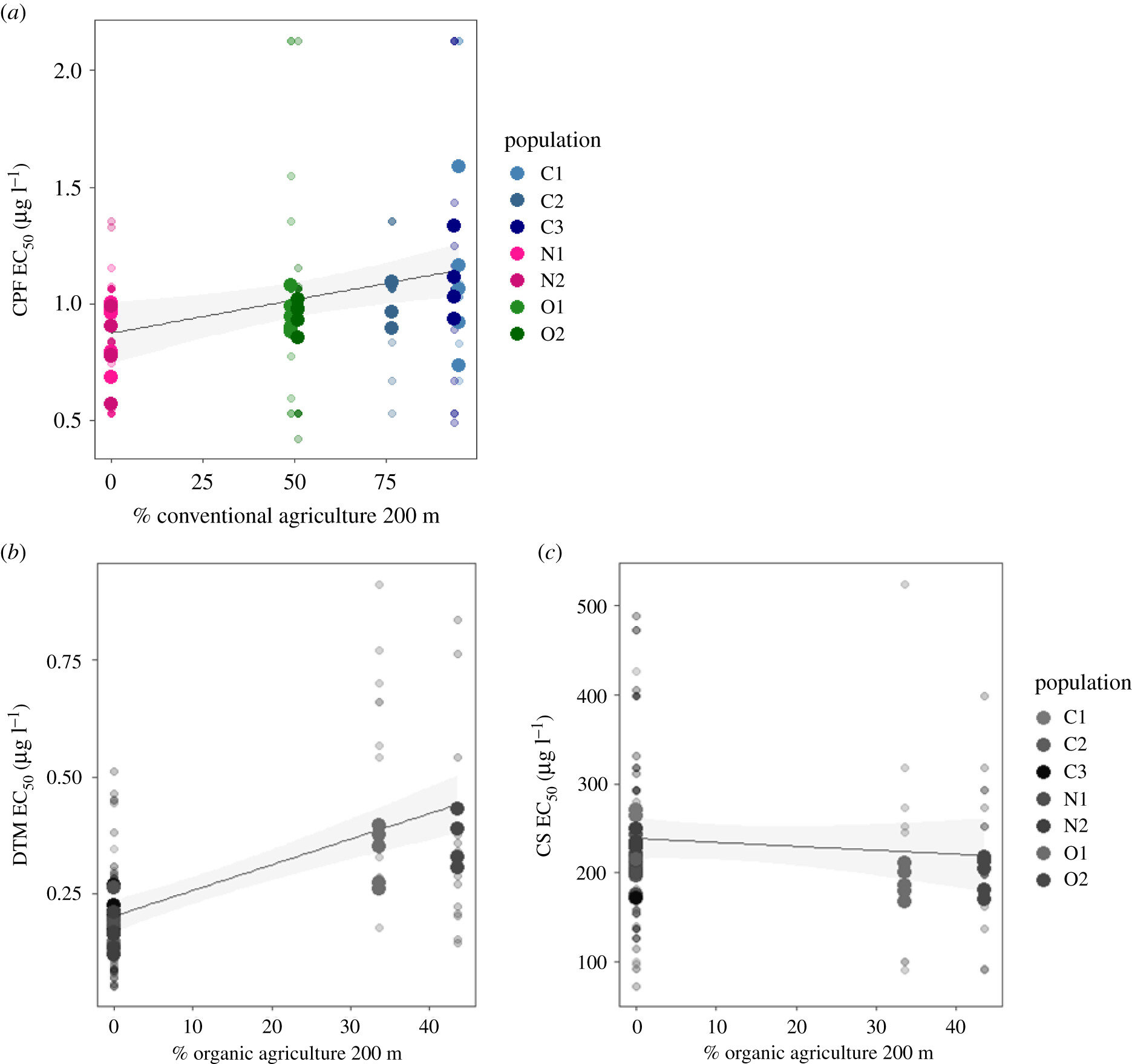Click here to sign in with or
Forget Password?
Learn more
share this!
2
6
Share
Email
December 1, 2021 report
by Bob Yirka , Phys.org
A team of researchers with the Laboratory of Aquatic Ecology, Evolution and Conservation, in Belgium has found that non-targeted creatures that are impacted by nearby pesticide applications adapt to both traditional and organic pesticides. In their paper published in the journal Proceedings of the Royal Society B, the group describes testing pond-dwelling water fleas in a variety of environments.
Water fleas are small freshwater crustaceans that live in ponds in a variety of places. In this new effort, the researchers collected samples of the tiny creatures from ponds near conventional farms and organic farms. As a control, they also collected water flea samples from ponds surrounded by natural reserves. All of the specimens came from ponds in Belgium and were close enough to one or the other type of farm to serve as a reservoir of runoff when it rained.
The researchers then tested all of the specimens to determine if they had developed a resistance to the pesticides (they looked for genetic differences from those not exposed to the pesticides) used on conventional and organic farms. Regulators allow organic farmers to use certain natural-origin chemicals to help keeps pests at bay.
The researchers found that specimens from ponds near both the conventional farms and organic farms had developed some degree of resistance to the chemicals that were used near their pond. They also found that water fleas living in ponds near very large conventional farms developed more resistance to the chemicals than was seen in ponds near smaller farms.
The researchers suggest that the application of pesticides to agricultural farms is a stressor to non-targeted species for both types of farming activities and results in adaptations that lead to resistance. They further note that claims of organic farming being safe for non-targeted species may be overstated.
Explore further
Explore further
© 2021 Science X Network
Facebook
Twitter
Email
Feedback to editors
1 hour ago
0
3 hours ago
0
3 hours ago
0
3 hours ago
0
Nov 30, 2021
0
12 minutes ago
12 minutes ago
12 minutes ago
13 minutes ago
19 minutes ago
1 hour ago
1 hour ago
Nov 30, 2021
Nov 29, 2021
Nov 28, 2021
Nov 28, 2021
Nov 28, 2021
Nov 24, 2021
More from Biology and Medical
Jun 02, 2021
Mar 03, 2021
Aug 04, 2021
Oct 15, 2021
Feb 28, 2017
Sep 14, 2018
2 hours ago
19 hours ago
Nov 30, 2021
Nov 30, 2021
Nov 30, 2021
Nov 30, 2021
Use this form if you have come across a typo, inaccuracy or would like to send an edit request for the content on this page. For general inquiries, please use our contact form. For general feedback, use the public comments section below (please adhere to guidelines).
Please select the most appropriate category to facilitate processing of your request
Thank you for taking time to provide your feedback to the editors.
Your feedback is important to us. However, we do not guarantee individual replies due to the high volume of messages.
Your email address is used only to let the recipient know who sent the email. Neither your address nor the recipient’s address will be used for any other purpose. The information you enter will appear in your e-mail message and is not retained by Phys.org in any form.
Get weekly and/or daily updates delivered to your inbox. You can unsubscribe at any time and we’ll never share your details to third parties.
More information Privacy policy
Medical research advances and health news
The latest engineering, electronics and technology advances
The most comprehensive sci-tech news coverage on the web
This site uses cookies to assist with navigation, analyse your use of our services, collect data for ads personalisation and provide content from third parties. By using our site, you acknowledge that you have read and understand our Privacy Policy and Terms of Use.


![[Special Recipe] Ethnic Fat-burning Soup](https://planetworkshops.org/wp-content/themes/blogstream/img/thumb-medium.png)


